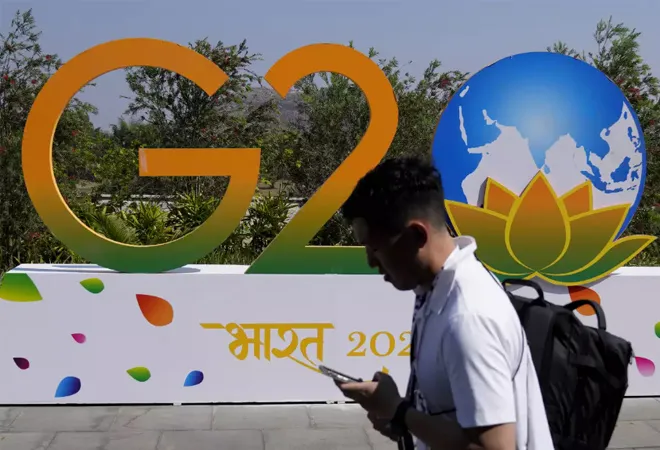-
CENTRES
Progammes & Centres
Location
India's G20 presidency can address global health challenges and help strengthen global governance to prevent future pandemics

The COVID-19 pandemic has brought about unprecedented changes to global health priorities, leading to the need for a more coordinated approach to addressing health issues. As India has assumed the presidency of the G20, the focus is on equitable recovery from the pandemic and developing a global health agenda.
The G20, with its primary venue for international economic and financial cooperation, has taken up the healthcare issue lately. Its engagement and leadership will be vital to strengthen the global health architecture and management of any future health emergencies. The G20 countries account for 80 percent of the world’s GDP and share 75 percent of global cross-border trade and two-thirds of the planet’s population, making its leadership even more crucial.
By learning from the lessons of the pandemic, the G20 can work to improve preparedness and response to future health crises. Among the lessons learnt are the need to invest in public health infrastructure, promote science- and evidence-based decision-making, tackle misinformation and lack of transparency, and prioritise international cooperation. The G20 health agenda should prioritise these lessons, directing the focus on to specific health issues of the highest commonality and avoiding a generalised agenda. Besides discussing specific health-related issues, addressing issues from a fundamental perspective is essential.
The G20 countries account for 80 percent of the world’s GDP and share 75 percent of global cross-border trade and two-thirds of the planet’s population, making its leadership even more crucial.
As the incumbent president of the G20, India has identified three priorities: Health emergencies, prevention and preparedness, and response; strengthening cooperation in the pharmaceutical sector; and digital health innovations and solutions to aid Universal Health Coverage. These priorities will be discussed at thematic discussions held across the Health Working Group (HWG) meetings and Health Ministerial Meeting (HMM).
India’s presidency of the G20 provides a unique opportunity for the country to lead important healthcare priorities and play a huge role in addressing the fundamental causes of global health inequities. The country can share its digital health architecture, including its technological successes such as CoWIN and the National Digital Health Mission (NDHM) with other nations and build their capacities.
The rationalisation of global health standard protocols was discussed during the Indonesia G20. It is important to have a standardised protocol that goes beyond just billing systems. Health Insurance Portability and Accountability Act (HIPAA) was originally developed as a billing system but has now become a health standard protocol. A coordinated approach is necessary to manage health threats effectively. India's digital finance, which connects individuals, government, and businesses in simplified ways, can be instrumental in improving access and availability.
Only people can help people, and locals are the best observers of their own communities. Therefore, in healthcare planning, it is essential to involve local communities as stakeholders. They can provide context-specific and customised care and become champions for their fellow citizens. The whole-of-society approach is necessary to promote equitable access to healthcare, particularly for marginalised communities who are often last in line. Developing systems that put local communities at the centre of healthcare planning is essential.
At the grassroots level, the cross-pollination of ideas between multi-stakeholders is critical to problem-solving. Thus, it is crucial to involve community elements and not just rely on departmental involvement. The lessons learnt from one village or ward can benefit other struggling communities.
Effectively utilising the Digital Health Taskforce and a Global Patient Safety Leaders Group is critical to enhancing knowledge in specific areas of digital health, bridging the digital divide, and bridging implementation gaps through system-level solutions and locally applicable innovative solutions.
The focus should be on health, not just healthcare to mitigate the long-term social and economic costs of illnesses and diseases. Thus, it is critical to prioritise all aspects of health—physical, mental, social, and emotional well-being—in healthcare planning. Preventive and promotive healthcare measures must be integrated into the healthcare ecosystem. Learning from best practices and traditional systems of health, such as ayurveda and yoga, can help in this regard.
Effectively utilising the Digital Health Taskforce and a Global Patient Safety Leaders Group is critical to enhancing knowledge in specific areas of digital health, bridging the digital divide, and bridging implementation gaps through system-level solutions and locally applicable innovative solutions. Although technology is at the forefront of healthcare planning in today's digital age, it is crucial to acknowledge the limitations of technology and have alternative plans in place. The digital divide and the fallibility of digital solutions are factors that must be considered, especially at the grassroots level. In contrast, the Global Patient Safety Leaders Group can bridge implementation gaps through system-level solutions and locally applicable innovative solutions.
The COVID-19 pandemic has highlighted the need for sharing intellectual property in emergency situations to ensure that vaccines, treatments, and diagnostics are accessible to all people, regardless of where they live. The G20 can monitor the process and ensure that the tiered pricing mechanism is being implemented fairly and transparently. Additionally, the G20 can provide grants and aid to countries to support the purchase of vaccines, treatments and diagnostics, as well as make systemic changes to healthcare systems to ensure that IP sharing and tiered pricing are implemented in a way that prioritises the needs of the population.
The digital divide and the fallibility of digital solutions are factors that must be considered, especially at the grassroots level.
It is important to establish a coordinated emergency response to health threats to prevent future pandemics and reduce the vulnerability of the system. This requires an adequate financing system to be in place. India's presidency should further strengthen the financial mechanisms for pandemic prevention, preparedness, and response and global governance institutions such as the World Health Organization (WHO) to address contemporary challenges related to global health mechanisms. India also needs to understand whether the G20 can strengthen global governance, particularly institutions such as the WHO, to address contemporary challenges related to global health mechanisms.
By implementing these measures, the G20 can work towards a more coordinated and effective approach to healthcare planning and ensure equitable access to healthcare for all. Overall, India's G20 presidency can address some pressing global health challenges and help strengthen global governance, institutions, and mechanisms to combat global health issues and emergencies. The G20's engagement and leadership will be vital to strengthen the global health architecture and management of any future health emergencies.
The views expressed above belong to the author(s). ORF research and analyses now available on Telegram! Click here to access our curated content — blogs, longforms and interviews.

Dr Ravi Mittal is an Indian Administrative Services (IAS) officer currently posted as the District Collector of the District Jashpur Chhattisgarh. He has an academic ...
Read More +
Dr Priyansh Nathani is a medical graduate from HBT Medical College and Dr R N Cooper Hospital Mumbai. His unfettered passion and strong interests lie ...
Read More +
Dr Surbhi Jain is a DM Resident in Neurology at the National Institute of Mental Health and Neuro-Sciences (NIMHANS) Bangalore. She did her post-graduation in ...
Read More +